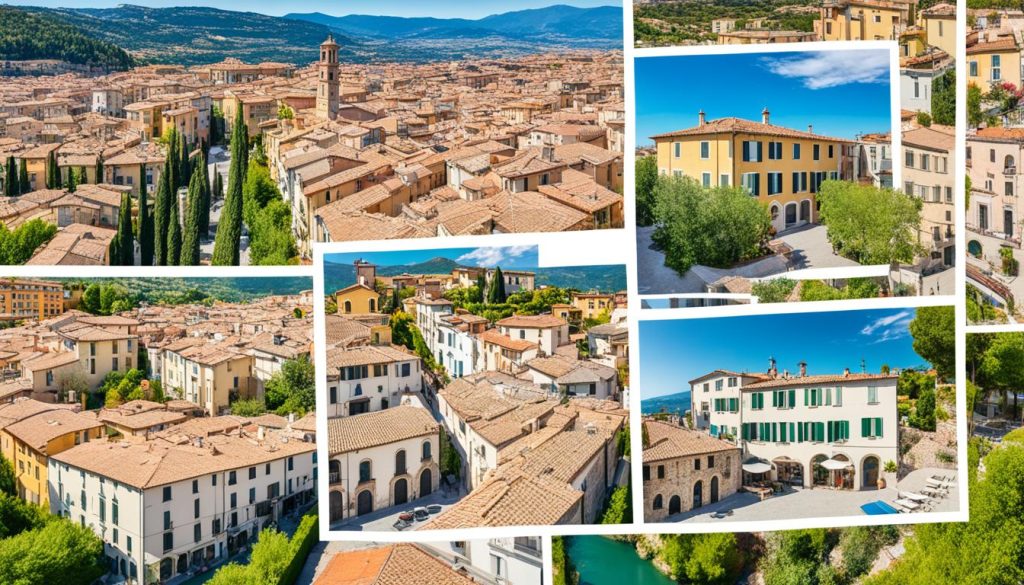Choosing between renting or buying a home in Italy is a big decision. For expats, Italy is a place filled with amazing culture, beautiful views, and tasty food. This guide aims to help expats find the right housing option for them. It will offer advice and information for a great life in Italy.
- Pros and Cons of Renting in Italy
- Pros and Cons of Buying in Italy
- Homeownership Rates in Italy
- Renting Prices in Italy
- Buying Prices in Italy
- Costs of Renting in Italy
- Costs of Buying in Italy
- Renting Restrictions for Expats in Italy
- Buying Restrictions for Expats in Italy
- How to Rent a Property in Italy
- How to Buy a Property in Italy
- Conclusion
- FAQ
- Source Links
Key Takeaways:
- Think about your future plans and money situation when choosing to rent or buy in Italy.
- Renting lets you move around and see different places. But, you might not have much say on changes to the property or rent going up.
- Buying gives you stability and a chance to make money from your home. Yet, it involves more work and money on things like taxes and repairs.
- In Italy, many people like to own their home. It’s estimated that about 75% of Italians are homeowners.
- The cost to rent a home in Italy changes depending on the area. Compared to other EU countries, the cost to buy a home is often lower.
Pros and Cons of Renting in Italy
It’s important to look at both sides when thinking about renting or buying in Italy. There are good and bad points to renting. Let’s dive deep into them.
Pros of Renting
- Flexibility: Moving around Italy is easy when you rent. This way, you can see all the beautiful areas the country has.
- Exploring Different Areas: Renting lets you check out different spots before sticking to one. This ensures you pick the ideal place to call home.
- Avoiding Maintenance and Property Taxes: Not worrying about upkeep or tax is a big relief. These tasks are usually on the owner’s list.
Cons of Renting
- Possible Rent Increases: Rents can go up, especially in the cool spots. This could be a downside.
- Limited Control Over the Property: You can’t do much without the landlord’s okay. Big changes might not be allowed.
- Potential Difficulty in Finding Long-Term Rental Options: Snagging a long-term rental in hot locations could be tough. Many people want the same thing.
For a clearer view, check out the table below. It shows the ups and downs of renting in Italy.
| Pros of Renting | Cons of Renting |
|---|---|
| Flexibility | Possible Rent Increases |
| Exploring Different Areas | Limited Control Over the Property |
| Avoiding Maintenance and Property Taxes | Potential Difficulty in Finding Long-Term Rental Options |
Pros and Cons of Buying in Italy
Thinking about getting a place in Italy? Understand both the good and tough sides. This will help make your mind.
Pros of Buying in Italy
- Stability: Italy makes you feel at home. Being part of a community is easier once you have your own space.
- Equity: Your property grows in value over time. It becomes a valuable asset as you pay your mortgage.
- Customization: You can make your place unique. From big renovations to small details, it’s all up to you.
Cons of Buying in Italy
- Property Taxes: Owning land in Italy means paying taxes. The size and location affect how much you pay.
- Maintenance: All upkeep is on you. This includes the usual tasks, fixing breaks, and updating when needed.
- Market Fluctuations: Property values can change. Think about what it could mean for you and your home’s worth.
| Pros | Cons |
|---|---|
| Stability | Property Taxes |
| Equity | Maintenance |
| Customization | Market Fluctuations |
Homeownership Rates in Italy
About 75% of Italians own their homes, showing a strong tradition in owning property. They value having their own space deeply.
As people grow older in Italy, they are more likely to own a home. By the time Italians reach 55 to 64 years, 84% own their place. This highlights the importance they place on owning a home as they age.
Investing in real estate is common in Italy, with nearly 1 in 5 Italians having other properties. This shows a strong interest in real estate as an investment.
| Age Group | Homeownership Rate |
|---|---|
| 55-64 years | 84% |
| 65-74 years | 78% |
| 75 years and above | 68% |
These numbers show that owning a home is a popular choice, especially as people get older in Italy.
Owning a home brings stability, continues a family legacy, and offers security. It gives a strong sense of being part of a community and lets people make their space theirs.
Discussing the pros and cons of renting versus buying in Italy, it’s key for expats to carefully review their situation against these home ownership numbers.
Renting Prices in Italy
Rental prices vary across Italy. They depend on the area and the property type’s demand. In 2022, prices mostly ranged from €7 to nearly €16 per square meter. The lowest were in Molise, and the highest were in Lombardy and the Aosta Valley.
Here’s a simple breakdown of average costs in Italy’s regions:
| Region | Average Rental Price per Square Meter (EUR) |
|---|---|
| Molise | 7 |
| Lombardy | 16 |
| Aosta Valley | 16 |
Note: These figures are rough. They can change depending on the area and the kind of property. Remember, city areas and popular spots usually cost more than rural places.
If you’re renting, know that costs can be influenced by several things. This includes how big and good the property is, where it is, the transport links, and how many people are looking to rent. For those moving to Italy, it’s smart to check the latest rental market news for your spot of choice. This helps you budget better and pick the right place to live.
Buying Prices in Italy
Property prices in Italy are usually lower than in many other European countries. Yet, the price varies a lot. It depends on where the property is and the kind of property it is.
Cities like Rome and Milan can have higher prices than the country’s average. This is because many people want to live there. Also, these cities are close to lots of things to do, have a lot of history, and are very cultural.
In Rome, for a place in the city centre, you might pay between €7,000 to €10,000 per square meter. Outside of the city center, it’s cheaper. There, prices go from about €4,000 to €6,000 for each square meter.
Prices in Milan’s city center are even more. You could pay between €8,000 to €14,000 per square meter. But, going away from the city centre makes it more affordable. Outside the center, prices range from €5,000 to €9,000 per square meter.
Remember, these prices are averaged out. The exact cost changes based on many things. For example, the condition of the property, how big it is, and exactly where it is in the city or region. It is smart for people moving to Italy (expats) to talk to local property experts. They can give better insights about property prices in the area they are interested in.
Costs of Renting in Italy
Expats should know about extra costs when renting in Italy. These costs depend on the rental terms and where the property is.
1. Rental Security Deposits
Before moving in, most Italian landlords ask for a security deposit, or “cauzione.” This is usually one or two months’ rent. It protects the landlord from property damage or unpaid bills.
2. Agency Fees
Some rental properties in Italy are handled by real estate agencies. If you rent through an agency, you might pay a one-off fee equal to a month’s rent. This fee covers the agency’s help in the rental process.
3. Utilities
Tenants usually pay for electricity, gas, water, and heating when renting in Italy. These costs change with the property’s size, how much you use, and where it’s located. So, be sure to plan for these costs on top of your rent.
Keep in mind, the costs we’ve talked about can change with each property. For the best deal, read your rental agreement carefully. Talk about extra charges with the landlord or agent before signing anything.
Costs of Buying in Italy
Buying property in Italy can include many expenses. These costs can greatly affect your budget. Knowing about these expenses helps make smart choices.
Notary Fees
Notary fees are a big part of buying in Italy. A notary checks all legal steps when you buy a property. Usually, their fees are between 1% and 2% of the property’s price.
Registration Taxes
Buyers must pay registration taxes in Italy. The amount changes depending on where the property is. On average, these taxes can be 3% to 7% of the property’s price.
VAT for New-Build Properties
New-builds come with an added cost, VAT. For houses, it’s usually 10%, but the rate can vary. Remember to include this tax in your budget for a new-build property.
Land Registry Tax
There’s also the land registry tax to consider. It’s about 1.5% of the property’s value. This tax is part of the buying process.
Mortgage Fees
If you get a mortgage, there might be extra fees. These could be for applying, checking the property, and legal work. Fees for mortgages change based on many factors.
After adding up all these costs, buying in Italy could be 10% to 15% more than the property’s price. Remember to think about all these expenses. They are important for your budget when buying property in Italy.
| Costs of Buying in Italy | Percentage Range |
|---|---|
| Notary Fees | 1% – 2% |
| Registration Taxes | 3% – 7% |
| VAT for New-Build Properties | Varies (typically 10%) |
| Land Registry Tax | Approximately 1.5% |
| Mortgage Fees | Varies |
Renting Restrictions for Expats in Italy
Most expats in Italy face few barriers when renting a home. Yet, some landlords may give priority to Italian tenants or set specific renter’s criteria. It’s wise for expats to seek advice from local rental experts and lawyers. This helps them fully grasp any hurdles they might face.
Rental barriers in Italy are rarely aimed at expats directly. Instead, landlords might choose tenants based on their own wishes. For instance, some show preference to Italian tenants because of shared cultural ties or for language ease.
Expats need to come ready with important paperwork and to meet the landlord’s conditions. These could involve showing proof of a steady income, solid references, and having a valid visa or residence permit.
Getting to know the local rental scene and the rules in the area where they’re looking to rent is key. This is because what’s required and what’s optional can differ from place to place or by the type of property.
It’s recommended to work with local rental experts. They’re well-versed in the rental market and can offer guidance. They help expats understand any unique renting rules in the area and find rentals that suit their needs.
Legal experts focused on real estate can also be a big help. They ensure expats know their renter’s rights and responsibilities. They can assist in looking over rental contracts, working out terms on the tenant’s behalf, and addressing any concerns about renting rules or legal matters.
By acting early and seeking expert advice, expats can smoothly handle the rental process. This sets them up for a trouble-free beginning in their new Italian living space.
| Pros | Cons |
|---|---|
| Most expats can rent without restrictions | Some landlords may prefer Italian residents |
| Flexibility to choose different rental properties and locations | Possibility of rent increases |
| No maintenance or property tax responsibilities | Limited control over the property |
| Ease of finding short-term rental options | Potential difficulty in finding long-term rental options |
Buying Restrictions for Expats in Italy
If you’re an expat thinking of buying in Italy, you need to know the rules. Most expats, especially from the EU or countries with special deals, can buy easily. This means a chance to own a piece of Italy and call it home.
But, there’s a twist. If your home country doesn’t let Italians buy there, you might face similar limits. It’s wise to get advice from locals and experts in property law. They can guide you through any tricky rules.
Getting help from the right people is key. They’ll check if you have any buying restrictions. They offer advice on what documents you need and how to complete the purchase without any hitches.
To make your move smooth, do your homework and get the right advice. This will help you understand the rules and handle any issues. Then, you can buy your dream property in Italy with confidence.
How to Rent a Property in Italy
Thinking of renting in Italy? It could be a great choice for expats. To understand how to rent, you need to know the steps. Here’s a simple guide:
- Search for available properties: Start by looking at properties online. You can also contact real estate agencies or check local adverts. Make sure to say where you want to live, how much you can pay, and what type of home you need.
- Contact landlords or rental agencies: Get in touch with the people renting out the places. Arrange to see the ones you like. Ask about the rent, how long you can stay, what’s included, and any extra costs.
- View the property: Go see the place in person. This will give you a better idea if it’s right for you. Look out for anything that needs fixing before you move in.
- Negotiate the rental agreement: If you’ve found the place you want, it’s time to talk about the details. This could include the rent, the deposit, how long you’ll stay, and any special things you need.
- Sign the contract: After agreeing on everything, it’s time to sign the rental contract. Make sure you understand what you’re signing. Keep a copy of the contract for yourself.
Knowing the rental laws in Italy is very important. This will make your renting experience better. It helps you know your rights and makes everything run more smoothly.
| Pros of Renting | Cons of Renting |
|---|---|
| Flexibility to explore different areas | Possible rent increases |
| No property maintenance responsibilities | Limited control over the property |
| Avoidance of property taxes | Potential difficulty in finding long-term rental options |
By understanding these steps, you can be ready to start your rental journey in Italy. Make sure to consider the pros and cons. This will help you find the right home for your expat life.
How to Buy a Property in Italy
Buying a property in Italy is thrilling, especially for expats. They’re looking to settle or invest in real estate. There are steps to make this process smooth and successful:
1. Research Properties
Start by looking into the Italian property market. This helps you understand what’s available, at what cost, and in which locations fit your needs. Use online property sites, real estate agencies, and local publications for insight.
2. Engage a Real Estate Agent
It’s important to work with a trusted real estate agent in Italy. They help you find the right properties, deal with sellers, and manage all the necessary paperwork.
3. Arrange Financing (if necessary)
If you need a loan to buy a property in Italy, talk to banks or lenders. The mortgage process in Italy might be different for non-residents. It’s wise to use professionals who understand this.
4. Make an Offer
When you find the property you like, negotiate the price and terms with the seller. Your agent can help you prepare a fair offer that fits your budget and reflects the property’s value.
5. Negotiate Purchase Terms
Negotiate with the seller to set the final conditions of the sale. This includes the completion date, any special requests, and arranging the payment of a deposit.
6. Sign a Preliminary Contract
After agreeing on the terms, you both sign a preliminary contract. This lays out the purchase details, like the price, deposit, and when you’ll finalize the deal.
7. Complete the Final Deed at the Notary’s Office
The final step is signing the deed at a notary’s office. The notary ensures everything is legal, checks the property, and oversees the signing. At this point, you pay the rest of the money and the property is officially yours.
Use experts like real estate agents, lawyers, and notaries to help you through this process. Getting legal advice is a good idea to make sure everything goes well and the purchase is secure.
Conclusion
Deciding to rent or buy a property in Italy requires careful thought. What’s best depends on your situation and plans. We’ve discussed the good and bad of each option to help.
Renting means less worry about your home and more flexibility. Buying offers security and a chance to increase your wealth. Think about how much rent or a home costs plus extra fees. Talking to experts, like agents and lawyers, is wise to understand everything.
Your pick between rental and buying is all about what matters to you. Use this advice to choose wisely. With the right information, you can enjoy your time living in Italy to the fullest.
FAQ
Q: Should I rent or buy a property in Italy as an expat?
Q: What are the pros and cons of renting in Italy?
Q: What are the pros and cons of buying in Italy?
Q: What are the homeownership rates in Italy?
Q: How much are rental prices in Italy?
Q: What are the property prices in Italy?
Q: What are the costs of renting in Italy?
Q: What are the costs of buying in Italy?
Q: Are there any renting restrictions for expats in Italy?
Q: What are the buying restrictions for expats in Italy?
Q: What is the process of renting a property in Italy?
Q: What is the process of buying a property in Italy?
Q: How do I make the best choice between renting and buying in Italy?
Source Links
- https://www.quora.com/What-are-the-pros-and-cons-of-moving-to-Italy-I-am-recently-retired-and-was-thinking-of-renting-or-buying-a-small-apartment-which-l-could-rent-as-an-Airbnb
- https://www.expatica.com/it/housing/buying/real-estate-in-italy-79629/
- https://britishexpats.com/forum/italy-77/long-term-rental-italy-768979/













